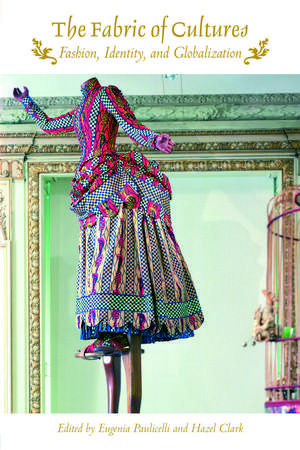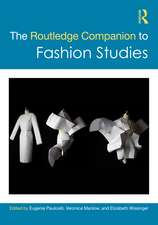The Fabric of Cultures: Fashion, Identity, and Globalization
Editat de Eugenia Paulicelli, Hazel Clarken Limba Engleză Paperback – 26 sep 2008
The Fabric of Cultures examines the impact of fashion as a manufacturing industry and as a culture industry that shapes the identities of nations and cities in a cross-cultural perspective, within a global framework. The collected essays investigate local and global economies, cultures and identities and the book offers for the first time, a wide spectrum of case studies which focus on a diversity of geographical spaces and places, from global capitals of fashion such as New York, to countries less known or identifiable for fashion such as contemporary Greece and soviet Russia.
Highly illustrated and including essays from all over the world, The Fabric of Cultures provides a comprehensive survey of the latest interdisciplinary scholarship on fashion, identity and globalisation.
| Toate formatele și edițiile | Preț | Express |
|---|---|---|
| Paperback (1) | 352.15 lei 6-8 săpt. | |
| Taylor & Francis – 26 sep 2008 | 352.15 lei 6-8 săpt. | |
| Hardback (1) | 1001.87 lei 6-8 săpt. | |
| Taylor & Francis – 26 sep 2008 | 1001.87 lei 6-8 săpt. |
Preț: 352.15 lei
Nou
Puncte Express: 528
Preț estimativ în valută:
67.41€ • 73.24$ • 56.66£
67.41€ • 73.24$ • 56.66£
Carte tipărită la comandă
Livrare economică 21 aprilie-05 mai
Preluare comenzi: 021 569.72.76
Specificații
ISBN-13: 9780415775434
ISBN-10: 0415775434
Pagini: 240
Ilustrații: 43 black & white halftones
Dimensiuni: 156 x 234 x 15 mm
Greutate: 0.36 kg
Ediția:1
Editura: Taylor & Francis
Colecția Routledge
Locul publicării:Oxford, United Kingdom
ISBN-10: 0415775434
Pagini: 240
Ilustrații: 43 black & white halftones
Dimensiuni: 156 x 234 x 15 mm
Greutate: 0.36 kg
Ediția:1
Editura: Taylor & Francis
Colecția Routledge
Locul publicării:Oxford, United Kingdom
Public țintă
Postgraduate and UndergraduateCuprins
List of Figures Notes on Contributors Acknowledgements Introduction Eugenia Paulicelli and Hazel Clark 1. From Potlach to Wal-Mart: Courtly and Capitalist Hierarchies through Dress Jane Schneider 2. Dressing the Nation: Indian Cinema Costume and the Making of a National Fashion, 1947-1957 Rachel Morris 3. Made in America: Paris, New York, and Postwar Fashion Photography Helena Cunha Ribeiro 4. Framing the Self, Staging Identity: Clothing and Italian Style in the Films of Michelangelo Antonioni (1950-1964) Eugenia Paulicelli 5. The Art of Dressing. Body, Gender and Discourse on fashion in Soviet Russia in the 1950s and 1960s Olga Gurova 6. Making Modernity Appropriate and Tradition Fashionable: Debates about Dress, Identity, and Gender in Ho Chi Minh City Ann Marie Leshkowich 7. Youth, Gender, and Secondhand Clothing in Lusaka, Zambia: Local and Global Styles Karen Tranberg Hansen 8. Fashion Design and Technologies in a Global Context Michiel Scheffer 9. Fabricating Greekness: from Fustanella to the Glossy Page Michael Skafidas 10. Fashion Brazil: South American Style, Culture and Industry Valéria Brandini 11. Fashioning "China Style" in the Twenty First Century Hazel Clark 12. From Factories to Fashion: An Intern’s Experience of a Global Fashion Capital Christina H. Moon Index
Notă biografică
Eugenia Paulicelli is Professor of Italian, Comparative Literature and Women’s Studies at Queens College and the Graduate Center of the City University of New York. She is also Co-Director of the Graduate Center Fashion Studies Concentration. Her recent publications include Fashion under Fascism: Beyond the Black Shirt (2004) and her articles on fashion have appeared in the journals, Fashion Theory and Gender & History.
Hazel Clark is Dean, School of Art and Design History and Theory, Parsons The New School for Design, New York. She is a design historian and theorist, with a specialist interest in fashion, design and cultural identity. She is the author of The Cheongsam (2000) and co-editor, with A. Palmer of Old Clothes, New Looks: Second Hand Fashion (2005).
Hazel Clark is Dean, School of Art and Design History and Theory, Parsons The New School for Design, New York. She is a design historian and theorist, with a specialist interest in fashion, design and cultural identity. She is the author of The Cheongsam (2000) and co-editor, with A. Palmer of Old Clothes, New Looks: Second Hand Fashion (2005).
Descriere
The Fabric of Cultures examines the impact of fashion as a manufacturing industry and as a culture industry that shapes identities of nations and cities in a cross-cultural perspective and within a global framework.











